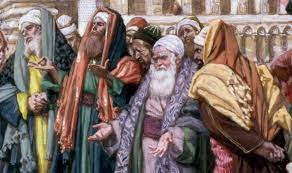Mint Spices and Herbs

Mint is mentioned twice in the Bible. Matthew 23:23 and Luke 11:42. The mint is a kind of small odoriferous herb, with which the Jews used to scatter on the floors of their houses and synagogues. (Strong. 2001. #2238).
The giving of the tenth part of all the increase of seeds to the LORD was instructed for the Jews according to Law if Moses. You shall truly tithe all the increase of your seed that the field brings forth year by year. (Deuteronomy 14:22). The Pharisees were very precise doing the letter of the law. They would tithe even the smallest yield of the garden. They paid tithe of mint and anise and cummin and they omit the weightier matters of the law. Matters such as judgment, mercy, and faith. These are the things that should be done, yet they were left undone by the Pharisees. Jesus said Woe unto you, scribes and Pharisees, hypocrites. (Matthew 23:23).
Luke 11:42 also shares the message to the Pharisees that their tithe of mint, rue and all manner of herbs have become more important than the judgment and the love of God; these they ought to have done and not to leave the other undone.
Scribes in the Bible were learned men in the Mosaic Law and in the sacred writings. The Scribes were interpreter of the Law of Moses and also a teachers. Scribes examined the more difficult and subtle questions of the law; added to the Mosaic Law decisions of various kinds thought to clarify or interpret its meaning and possibilities and did this to the harm and destruction of religion. (Strong. 2001. #1122).
Pharisee was the sect that started after the Jewish exile. They were always seeking distinction and praise by their outward observance of their practice of religion. It was their form of piety. They were loud and vocal in their prayers and alms giving and they prided themselves on going good works. They were hostile enemies of Jesus and did not believe in His cause nor did they believe He was the Messiah; and were in turn severely rebuked by him for their avarice, ambition, hollow reliance on outward works, and affection of piety in order to gain popularity. (Strong. 2001. #5330).
Hypocrites is defined as one who answers, an interpreter. Also an actor or stage player. They are a dissembler, and pretender. (Strong. 2001. #5273).
Pliny mentions mint was highly valued. It was used as a condiment in ancient times, from its aromatic qualities, in the same way as it is utilized in present day for a sauce to lamb. The very smell of mint restores the spirits, and its flavor gives a remarkable zest to food and used in sauces. It has the effect of preventing milk from turning sour, or curdling and thickening.
Because of this characteristic it was commonly put into milk used for drinking, to prevent any danger of persons being choked. The juice of mint fresh gathered, inhaled, and was a remedy for affections of the nostrils. Beaten up and taken in vinegar, mint was a cure for cholera, and for internal fluxes of blood. Mint is an effectual preventive of chafing of the skin, even if held only in the hand. (Pliny the Elder.1855.p.4257-4259).
References:
Pliny the Elder. (1855). The Natural History, ed. John Bostock. Medford, MA: Taylor and Francis, Red Lion Court, Fleet Street, 1855), 4257-59.
Strong, James. (2001).The New Strong’s Expanded Exhaustive Concordance of the Bible. Nashville: Thomas Nelson Publishers.
Cite Article Source
MLA Style Citation:
Holstein, Joanne “Mint Spices and Herbs:.” Becker Bible Studies Library Mar 2015.< https://guidedbiblestudies.com/?p=2399,>.
APA Style Citation:
Holstein, Joanne (2015, March) “Mint Spices and Herbs:.” Becker Bible Studies Library. Retrieved from https://guidedbiblestudies.com/?p=2399,.
Chicago Style Citation:
Holstein, Joanne (2015) “Mint Spices and Herbs:.” Becker Bible Studies Library (March), https://guidedbiblestudies.com/?p=2399, (accessed).


